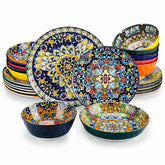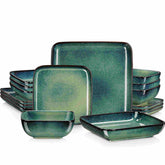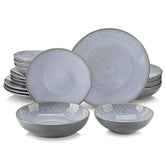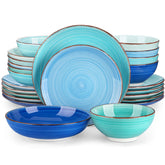Instagram-Worthy Plate Styling: 5 Rules for Photogenic Tableware Combinations
Navigation
- Core Techniques: 5 Plate-Styling Rules Instagram Pros Swear By
- Photogenic Plate Buying Guide
- Instagram Workflow: From Styling to Posting
- FAQs
Food photography is now an art form, and Instagram is where stunningly styled meals are displayed. However, not all food photos receive the attention they deserve. Most food pictures are unappetizing and dull because of bad plate styling, lighting, and composition. If your food pictures are usually flat and unbalanced, breathe a sigh of relief; there is hope! Follow these five plate styling rules to transform any meal into an Instagram masterpiece, whether you're a seasoned food blogger or a style novice.
Core Techniques: 5 Plate-Styling Rules Instagram Pros Swear By
Rule 1: Master the Base Tone
The starting point on which any beautiful food picture is found starts with the plate. The color and texture of your dinnerware of choice contribute heavily to setting the mood for the overall presentation of your food. The best colors for this purpose are neutral colors like timeless favorites white, beige, and light matte pastels. Neutral colors look lovely while drawing attention to the ingredients' tones without overwhelming them or weakening them in any manner.
Choose matte stoneware pieces that are available in soft, muted tones of off-white, light gray, or beautiful pastel pink colors.
Avoid highly reflective plates, as they can create excessive glare.
Plates with a little roughness on the surface work best, since this will eliminate reflections while also giving depth to the overall visuals.
Rule 2: Contrast Color Clashing
It's important to balance the colors on your plate setup, as it actually makes the visual effect and overall brightness of your dish stand out. By incorporating contrasting colors, you can make the food really pop, which not only grabs attention but also makes it stand out incredibly in photos.
Roasted meats, bright carrots, and pumpkin soup pop against cool-toned plates like deep blue or slate gray.
Serve salads, seafood, and light dishes on warm-hued plates like rich terracotta or vibrant mustard yellow.
Utilize the color wheel to discover complementary colors for dramatic effect.
Rule 3: Layering Magic
Layering gives depth to your photo, and your photo will be more interesting and dynamic.
Nest plates of varying diameters to gain depth.
Put linen or woven napkins under plates for added texture.
Include decorative cutlery, along with brightly colored edible flowers or fresh herbs, to provide the dish with an appealing look and offer an inviting presentation.
Try using a slightly bigger dinner plate as your base piece, then stunningly layer it with a smaller salad plate on top to create a sophisticated and elegant look.
Rule 4: Organic Accent Hack
Incorporating organic elements into the presentation can significantly enhance a plate's overall aesthetic, making it feel considerably more natural and inviting to those who view it.
Examples of organic accents are a range of things such as sprigs of fresh rosemary, cracked pepper, bright lemon zest, and delicate microgreens.
This technique introduces a welcome freshness and an invigorating feeling of movement, which makes your plate exude a lively and dynamic feel that brings it to life.
Use accents judiciously in small quantities if they contain a lot of components, their effect will turn into clutter instead of charm.
Rule 5: Geometric Line Play
Angles and symmetry are basic elements that are responsible for creating a layout for the plate that is not only pleasing to the eye but also evocative of the eye.
The use of spiral drizzles of sauce or the intentional positioning of food in concentric circles creates an aesthetically pleasing visual appearance of movement and flow.
Employ a parallel alignment approach to placing several elements, such as asparagus spears placed in good order or the precise cuts of steak placed evenly.
Off-center placements contribute to a visually appealing, artistic presentation.
Position the food on square plates diagonally to incorporate a more dramatic look.
Photogenic Plate Buying Guide
Material Guide: Finding the Perfect Plate
The selection of the right material for your plates plays an important role in overall appearance as well as how light interacts with your entire setup.
Matte Stoneware is especially suited for reducing glare while offering a sophisticated and textured look that contributes to its overall attractiveness.
Glossy Porcelain is best suited for classy environments but needs to be lit properly to prevent reflections.
Tempered glass is ideal for food presentation with fewer distractions, but it requires contrast to view.
Size Chart: Selecting the Right Dimensions
A proportionate plate enhances food presentation.
Dinner Plates must be 10-11 inches to be suitable for main courses and set meals.
Salad Plates must comprise 6-7 inches to be perfect for side dishes, light entrees, and plate garnish.
Instagram Workflow: From Styling to Posting
Lighting Hacks for the Best Food Shots
Lighting can make or break a food photo, with natural light being ideal for soft, appealing images.
Use golden hours. Photograph between 9-11 AM for optimal diffused natural light.
Utilize homemade reflectors. Employ aluminum foil on cardboard to reflect light and remove shadows.
Try diffused lighting. Have vertical curtains gently draped over the windows so as to easily diffuse the intensity of direct sunlight entering the area.
Good plate composition needs the correct camera angle to translate into a photograph.
Angles That Sell
It is necessary to understand the perfect angles for taking photographs of food.
Flat Lay (Overhead Shot) works well for tablescapes and full setups.
45° Tilt is an ideal angle for capturing the aesthetic charm of depth, like layered cakes or stackable dishes.
Close-ups perfectly call attention to details, such as textures, garnishes, and sauce drizzles.
Editing Presets for a Polished Look
Editing presets enhances food photos by improving color balance and creating a pleasing composition. Lightroom Mobile offers excellent presets for a polished look. The warm minimalist preset boosts exposure by +1.2, adjusts tint by +15, and increases grain by +20 for added depth and warmth. It helps define textures and lends an organic but sophisticated quality. Tuning sharpness and clarity can also help to make the food details pop without making it look artificial or over-edited. Controlling warmth and coolness is equally important for aesthetic balance, unique rustic and warm settings benefit from warmer tones, while cool tones work particularly well in modern and minimalist tables. Having teased these elements out, you can, through careful adjustments, produce a professional quality food image.
FAQs
How to Style Small Plates Without Looking Cramped?
Small plates can look stylish if you use beautiful oversized trays as a base for them to create a negative space. You must not overfill the plate with food. Keep the food quantity and arrangement minimal to devise a sense of neatness and elegance.
How to Avoid Glare on Glossy Plates?
Diffused lighting techniques work best to avoid glare on glossy plates. Sheer curtains on windows help prevent direct sunlight exposure and glare on glossy plates.













